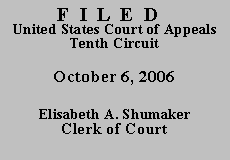

STEPHEN P. LEMONS,
Petitioner-Appellant,
v.
ERIC FRANKLIN, Warden; RON
WARD, Director; ATTORNEY
GENERAL OF THE STATE OF
OKLAHOMA,
Respondents-Appellees.
Before KELLY, McKAY, and LUCERO, Circuit Judges.
Appellant was convicted of first degree murder on June 21, 1995, by a jury
in Oklahoma state court and was sentenced to life in prison without the
possibility of parole. His conviction and sentence were sustained by the
Oklahoma Court of Criminal Appeals ("OCCA") on August 23, 1996.
Appellant
did not pursue any further direct appeals. He did, however, file an application
for post-conviction relief in state court on January 3, 2005. The state trial court
denied his application on February 17, 2005, and on May 3, 2005, the OCCA
affirmed the that denial. On July 12, 2005, Appellant filed this 28 U.S.C. § 2254
petition in the Northern District of Oklahoma claiming that his original trial
violated several of his constitutional rights. The district court dismissed
Appellant's § 2254 petition as untimely and denied him a certificate of
appealability ("COA"). Order, 1 (N.D. Okla. Feb. 28, 2006); Order, 3 (N.D.
Okla. Apr. 12, 2006).
To obtain a COA, Appellant must make a "substantial showing of the denial of a constitutional right." 28 U.S.C. § 2253(c)(2). To do so, Appellant must demonstrate "that reasonable jurists could debate whether (or, for that matter, agree that) the petition should have been resolved in a different manner or that the issues presented were adequate to deserve encouragement to proceed further." Slack v. McDaniel, 529 U.S. 473, 484 (2000) (quotations omitted).
Appellant has not met this burden. The Antiterrorism and Effective Death Penalty Act ("AEDPA") established a one-year statute of limitations period for § 2254 petitions. See 28 U.S.C. § 2244(d). In Appellant's case, the limitations period began to run on November 21, 1996, ninety days after the OCCA's decisionthe end of the time period for filing a petition for writ of certiorari with the Supreme Court. See Locke v. Saffle, 237 F.3d 1269, 1273 (10th Cir. 2001). Appellant argues that AEDPA's time limitations do not apply to him because his direct appeal was pending when AEDPA was enacted. However, as the district court noted, because Appellant initiated his § 2254 petition after AEDPA's enactment, AEDPA's limitations apply to his petition. See Feb. 28 Order at 3-4 (citing Lindh v. Murphy, 521 U.S. 320, 336-37 (1997)).
Appellant also argues that his mental state in 1996 entitles him to equitable tolling. Again, we agree with the district court's determination that Appellant's claims "are generic and lack specificity sufficient to explain the lengthy delay in pursuing his claims." Id. at 4.
Further, Appellant argues that he was not aware of AEDPA's requirement. This explanation, however, does not toll AEDPA's requirements. Id. at 5 ("[I]gnorance of the law, even for an incarcerated pro se petitioner, generally does not excuse prompt filing." (quoting Marsh v. Soares, 223 F.3d 1217, 1220 (10th Cir. 2000) (quotation omitted))).
Finally, Appellant makes an argument of actual innocence. A claim of actual innocence, however, does not by itself toll AEDPA's filing requirements, see Miller v. Marr, 141 F.3d 976, 978 (10th Cir. 1998), and we agree with the district court's analysis that Appellant "has failed to demonstrate that his inability to file his habeas petition within the one-year period was due to circumstances beyond his control." Feb. 28 Order at 5 (citing Gibson v. Klinger, 232 F.3d 799, 808 (10th Cir. 2000)).
We have carefully reviewed Appellant's brief, the district court's disposition, and the record on appeal. Nothing in the facts, the record on appeal, or Appellant's filing raises an issue that meets our standard for the grant of a COA. For substantially the same reasons set forth by the district court in its February 28, 2006, order, we cannot say "that reasonable jurists could debate whether (or, for that matter, agree that) the petition should have been resolved in a different manner." Slack, 529 U.S. at 484. We, therefore, DENY Appellant's request for a COA and DISMISS the appeal.
Entered for the Court
Monroe G. McKay
Circuit Judge